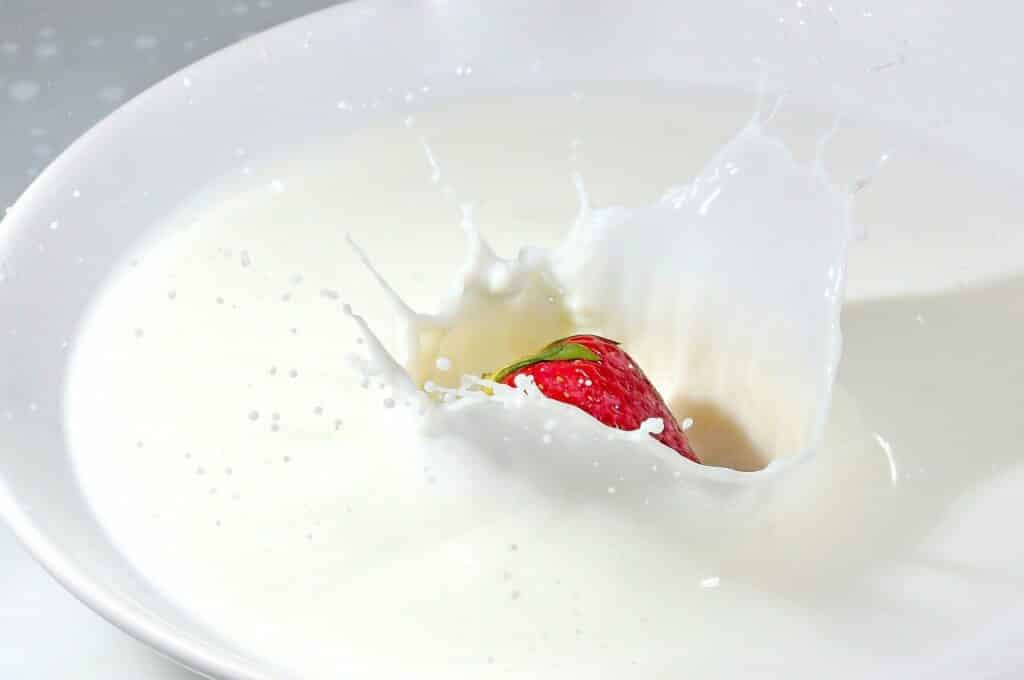Dogs depend on their owners for provision and care.
It’s common to see your pup staring at you with puppy eyes as you drink anything, including vitamin D milk.
However, you’re left confused, wondering whether your dog will be safe after drinking vitamin D milk.
So, is vitamin D milk good for dogs?
Yes, vitamin D milk is good for dogs in moderation.
Excessive vitamin D milk exposes dogs to the risk of kidney stones.
Knowing the benefits of vitamin D milk and how much of it to give your dog is essential.
You also want to know the risks of giving your pup excessive vitamin D milk.
Keep reading for these and more concerns about feeding your canine friend vitamin D milk.

Benefits of Vitamin D Milk to Dogs
Vitamin D milk is an excellent source of:
- Calcium
- Iron
- Phosphorus
- Vitamin A
- Potassium
These nutrients benefit your furry friend in the following ways:
Developing Strong Bones and Teeth
Calcium and phosphorus are essential for developing strong bones and teeth in dogs.
Calcium ensures that there’s bone strength and density.
On the other hand, phosphorus increases bone mineralization.
Vitamin D aids in the absorption of calcium in dogs.
As a result, it plays an essential role in maintaining healthy bones and teeth.
Hunting dogs and those that exercise a lot need sufficient calcium in their diets.
This will make them stronger to carry on with their activities.

Aiding Muscle Function
Potassium is one of the minerals that help with muscle function in dogs.
It works with sodium to enable dogs to have smooth muscle contraction.
This is vital in keeping the heart’s muscles functioning well.
It also aids in other functions such as digestion and balancing electrolytes.
You’ll often find potassium in dog food meant for working dogs and those that exercise a lot.
If your dog doesn’t get enough potassium in his diet, he may suffer from muscle weakness.
Vitamin A is also vital in maintaining healthy muscles.
It helps keep the cells that line the surfaces of muscles working well.
Improving Night Vision
Vitamin A is vital for night vision in dogs.
It helps to keep the cells lining the retina healthy.
These cells enable dogs to see clearly at night and in low light.
Dogs that lack vitamin A in their diets are prone to developing dry eyes and night blindness.
Vitamin A is also essential for puppies as it helps develop their vision.
How Much Vitamin D Milk Should Dogs Drink
Vitamin D milk is a safe treat for dogs when consumed in small quantities.
According to the American Kennel Club, a few tablespoons of occasional milk is excellent for dogs.
Giving your pup an entire bowl of milk is a health hazard.
It’s also advisable to consult your veterinarian before giving your fido milk.
Some dogs may have conditions like lactose intolerance that make it hard for them to digest milk.
Risks of Excessive Vitamin D Milk to Dogs
Too much of anything is bad.
The same case applies to vitamin D milk and dogs.
Excessive consumption of vitamin D milk is toxic to dogs and can lead to the following:
Kidney Stones
Toxic doses of vitamin D in dogs can lead to kidney stones.
Kidney stones are hardened deposits that form in the kidneys and cause immense pain.
Dogs develop kidney stones when there is an imbalance between urine and blood.
When there’s too much calcium in the blood, it’s excreted through the urine.
The deposits then form kidney stones that block urine flow and cause immense pain.
If not treated early, kidney stones can lead to renal failure.
Other symptoms of kidney stones in dogs include:
- Excessive thirst
- Lethargy
- Loss of Appetite
- Vomiting
- Diarrhea
- Abdominal pain
Excessive Thirst and Urination
Dogs that consume too much vitamin D milk may start drinking water and urinating excessively.
This is because the body is trying to remove the excess calcium from the blood.
Increased urination or polyuria in dogs can lead to dehydration.
If not managed early, polyuria can cause kidney damage and even failure.
Lactose Intolerance
Many dogs are lactose intolerant, so they cannot digest milk properly.
Dogs with this condition may experience vomiting and diarrhea after consuming vitamin D milk.
If you notice these symptoms in your dog after giving them milk, stop immediately and consult your veterinarian.
How to Know if Your Dog Is Lactose Intolerant
Dogs are affected by lactose in different ways.
While some may only show mild symptoms, others will have severe ones.
Dairy products are the leading cause of lactose intolerance in canines.
Therefore, the best way to know if your dog is lactose intolerant is by observing him after consuming milk.
Look for the following symptoms of lactose intolerance:
- Abdominal pain
- Vomiting
- Loose stools
- Diarrhea
- Bloating
It’s worth noting that it can be hard to determine if your pup is lactose intolerant after giving him excessive milk.
Too much milk can lead to diarrhea, vomiting, and bloating.
Because these symptoms are similar to lactose intolerance, you’ll be confused in determining what the dog is ailing from.
Is Vitamin D Milk an Excellent Calcium Source for Dogs?
Although vitamin D milk is high in calcium, it’s not an excellent source for dogs.
Vitamin D milk is associated with other health risks like kidney stones in dogs.
Excellent calcium sources for dogs include:
- Spinach
- Chicken
- Broccoli
- Salmon
- Kale
- Carrots
- Sardines
- Celery
Frequently Asked Questions
What happens if a dog drinks milk?
If a dog drinks milk, he may be exposed to lactose intolerance.
You’ll notice symptoms of lactose intolerance like bloating, vomiting, and diarrhea.
Is it OK for dogs to drink milk every day?
It’s not okay for dogs to drink milk every day.
Excessive milk is a recipe for kidney stones, lactose intolerance, and polyuria.
The Bottom Line
Vitamin D milk is good for dogs in moderation.
If you must give your dog milk, ensure it’s in small quantities and only occasionally.
Your dog will be lactose-intolerant if he displays symptoms like vomiting, diarrhea, and bloating after drinking milk.
In this case, stop giving him the milk and consult your vet.
- What Dog Breeds Have Pink Skin? - March 24, 2023
- What Are the Most Inspiring Dog Breeding Quotes? - March 20, 2023
- Can Pheromone Spray Help Improve Dog Breeding Results? - March 19, 2023








